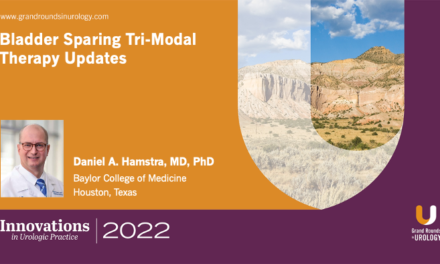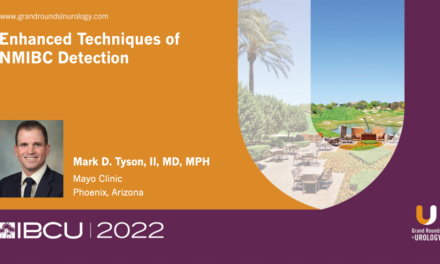Seth P. Lerner, MD, presented “The Contribution of SWOG to Bladder Cancer Clinical Trials” at the 6th International Bladder Cancer Update on November 18, 2022, in Scottsdale, Arizona.
How to cite: Lerner, Seth P. “The Contribution of SWOG to Bladder Cancer Clinical Trials” November 2022. Accessed Apr 2025. https://grandroundsinurology.com/the-contribution-of-swog-to-bladder-cancer-clinical-trials/
The Contribution of SWOG to Bladder Cancer Clinical Trials – Summary
In this 18-minute video, Seth P. Lerner, MD, Professor of Urology and Vice-Chair for Faculty Affairs in the Scott Department of Urology at the Baylor College of Medicine, provides a comprehensive history of Bacille Calmette-Guerin (BCG) and SWOG ’s innovation in bladder cancer over the past three decades, particularly with non-muscle invasive cancer. He begins with the SWOG 8216 and SWOG 8795, randomized trials that showed the benefits of BCG in the 1990s. Lerner describes the transition to weekly maintenance and induction that began in SWOG 8507, which demonstrated maintenance therapy is better than induction. Lerner compares the recurrence-free survival and worsening-free survival as an obligation of doctors to follow patients due to likelihood of recurrence probability. Lerner prefaces SWOG S1602, which was created with the goal to analyze if priming the immune system gives patients a faster induction rate. The study analyzed the Japanese strain with and without vaccinations for the goal of creating new strain on the market. He also describes SWOG 1605, a single-arm 12-month trial, as there is no comparator. Lerner mentions that this was a less effective study that showed some concerning toxicities. Lerner is currently involved in SWOG 1011, a surgical study analyzing extended versus standard dissection in bladder cancer. The trial has completed accrual and will determine if there is a benefit to extended pelvic lymph node dissection (ePLND). Lerner overviews the SWOG 1314 Coxon trial to validate predictive biomarkers in chemotherapy regimens. The GC score was predictive. Lerner describes SWOG’s more recent trials, including the current trial, SWOG 1806, which is the largest North American bladder sparing trial, and the SUBTYP Trial, which differs treatment by tumor subtypes. Lerner suggests that the SUBTYP Trial will help usher in a more personalized biomarker-driven therapy approach, as patients and treatments differ in such unique ways.
About the 6th International Bladder Cancer Update:
The International Bladder Cancer Update (IBCU) is a CME conference focused on the diagnosis and treatment of bladder cancer. The conference offers medical professionals an opportunity to listen to updates from, and interact with, expert international faculty to improve knowledge and determine best treatment practices to improve patient outcomes. IBCU encompasses expert lectures, interactive discussions, a panel roundtable, debates, and case presentations. It is physician-led, multi-supported, and designed for urologists, urologic oncologists, and other healthcare professionals involved in the treatment of bladder cancer.
For further educational activities from this conference, visit our collection page.
ABOUT THE AUTHOR
Seth P. Lerner, MD, FACS, is Professor of Urology and Vice-Chair for Faculty Affairs in the Scott Department of Urology at the Baylor College of Medicine in Houston, Texas. He holds the Beth and Dave Swalm Chair in Urologic Oncology. Dr. Lerner is the Director of Urologic Oncology and the Multidisciplinary Bladder Cancer Program, also at Baylor.
Dr. Lerner earned his medical degree from the Baylor College of Medicine, completed a surgical internship at Virginia Mason Hospital in Seattle, and returned to Baylor for his residency training. He completed a two-year fellowship at the University of Southern California in Urologic Oncology and Reconstructive Surgery and joined the full-time Baylor faculty in 1992.





